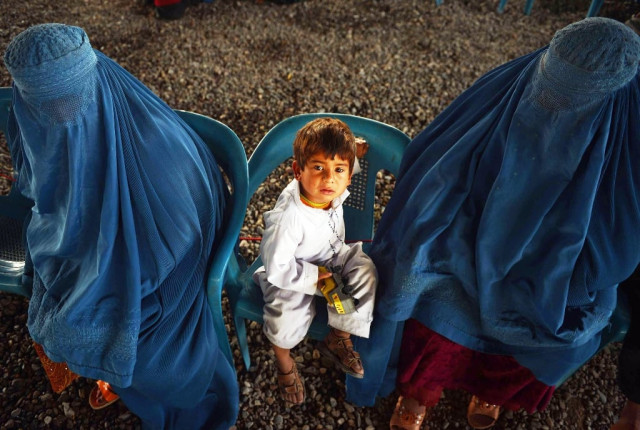Pakistan plans talks with Afghanistan, UN refugee agency
Fresh wave of unrest stalls voluntary return of Afghans

PHOTO: AFP/ FILE
Pakistan has the world's second largest refugee population, with 1.6 million of them registered and about a million unregistered, refugees from Afghanistan, most of whom fled the Soviet occupation of their country in the 1980s. The UN says the number of Afghans voluntarily returning from Pakistan has fallen to about 6,000, well below last year’s 58,211, as violence worsens in Afghanistan.
Pakistan extends Afghan refugees stay until end of 2016
On Tuesday, Prime Minister Nawaz Sharif had granted a six month extension for Proof of Registration (POR) card holding Afghan refugees to remain in the country till December 31. However, Nawaz directed cabinet ministers for foreign affairs and states & frontier regions (Safron) to engage the United Nations High Commissioner for Refugees (UNHCR) and the Afghan government for the ‘gradual relocation’ of refugee camps from Pakistan to Afghanistan.
On Thursday, a high-level inter-ministerial meeting was held at the Foreign Office and deliberated on the way forward and formulated modalities for effective implementation of repatriation and management of Afghan refugees in Pakistan.
The meeting was co-chaired by Prime Minister’s Adviser on Foreign Affairs Sartaj Aziz and Safron Minister Lt-Gen (retd) Abdul Qadir Baloch.
A statement issued by the Foreign Office said keeping in view the current political, socio-economic and security scenario, the meeting recognised the need for early return of Afghan refugees to their homeland with honour and dignity.
However, the emphasis remains on sustainable repatriation with efforts to help returnees reintegrate into Afghan society.
In this regard, it was decided to engage the Afghan government and UNHCR immediately and devise concrete steps to ensure early, sustained returns.
For this purpose, the Ministry of Foreign Affairs will approach Kabul bilaterally on the political and diplomatic levels, while the Safron ministry will engage UNHCR and Refugees and Repatriations ministry of Afghanistan to pursue and devise modalities which ensure the early returns, as well as the possibility of shifting Afghan refugees gradually from Pakistan to settlements at safer and peaceful areas of Afghanistan.
UN urges Pakistanis not to label Afghan refugees 'terrorists'
These modalities will be formally discussed at the upcoming Tripartite Commission meeting on repatriation of Afghan refugees in Pakistan.
Officials also welcomed the announcement of the UN High Commissioner for Refugees to double the repatriation grant from $200 to $400 for registered Afghan returnee.
“This enhancement will incentivise returns and help anchor returnees in Afghanistan,” the statement said.
However, the meeting felt that this incentive has to be complemented by access to land, infrastructural development and provision of basic amenities like health, education and water along with livelihood opportunities by the Afghan government to sustain these returns and ensure reintegration.
As a gesture of goodwill PM Nawaz has directed free wheat for Afghan returnees at the newly established settlements inside Afghanistan for three years.
The meeting emphasised that the international community needs to support Kabu’sl endeavours for reintegration of displaced people through robust development interventions. Donors, they said, must ensure refugees and IDPs are an integral part of Afghanistan’s National Development Strategies and Plans.
Further Islamabad and Kabul will utilise political and diplomatic channels to pursue these objectives with the donors especially at the upcoming conferences in New York and Brussels.
An inter-ministerial committee chaired by Safron secretary was directed to formulate a realistic action plan in the light of the PM’s directive of June 28.
The plan will be finalised in close coordination with the federal and provincial governments and other stakeholders, as well as, where required, in consultation with UNHCR and MoRR Afghanistan to ensure its effective implementation. This committee will also oversee and monitor the repatriation process and present monthly reports.
Published in The Express Tribune, July 1st, 2016.



1724319076-0/Untitled-design-(5)1724319076-0-208x130.webp)















COMMENTS
Comments are moderated and generally will be posted if they are on-topic and not abusive.
For more information, please see our Comments FAQ